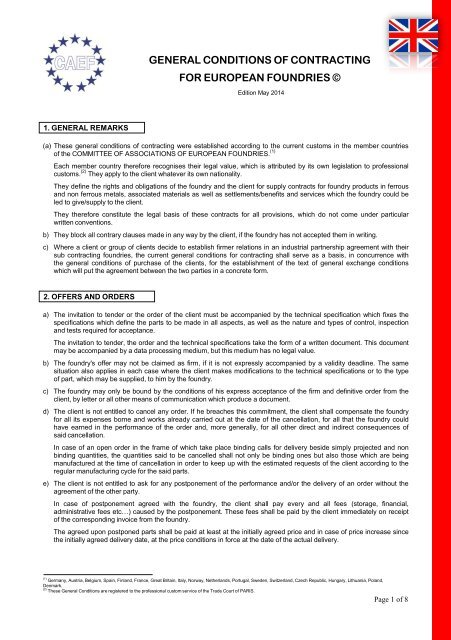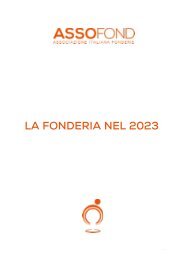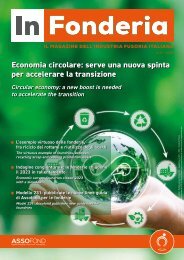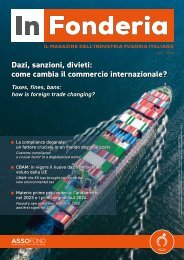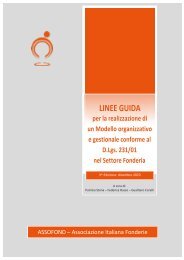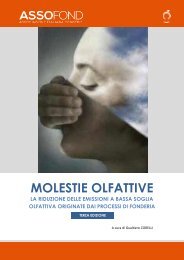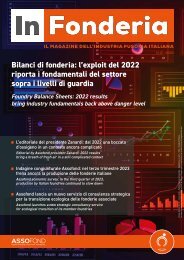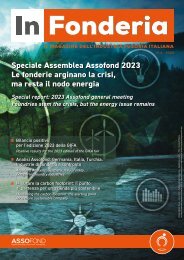Condizioni generali di contratto delle Fonderie Europee - Testo inglese
Condizioni generali di contratto delle Fonderie Europee - Testo inglese - edizione 2014
Condizioni generali di contratto delle Fonderie Europee - Testo inglese - edizione 2014
You also want an ePaper? Increase the reach of your titles
YUMPU automatically turns print PDFs into web optimized ePapers that Google loves.
GENERAL CONDITIONS OF CONTRACTING<br />
FOR EUROPEAN FOUNDRIES ©<br />
E<strong>di</strong>tion May 2014<br />
1. GENERAL REMARKS<br />
(a) These general con<strong>di</strong>tions of contracting were established accor<strong>di</strong>ng to the current customs in the member countries<br />
of the COMMITTEE OF ASSOCIATIONS OF EUROPEAN FOUNDRIES. (1)<br />
Each member country therefore recognises their legal value, which is attributed by its own legislation to professional<br />
customs. (2) They apply to the client whatever its own nationality.<br />
They define the rights and obligations of the foundry and the client for supply contracts for foundry products in ferrous<br />
and non ferrous metals, associated materials as well as settlements/benefits and services which the foundry could be<br />
led to give/supply to the client.<br />
They therefore constitute the legal basis of these contracts for all provisions, which do not come under particular<br />
written conventions.<br />
b) They block all contrary clauses made in any way by the client, if the foundry has not accepted them in writing.<br />
c) Where a client or group of clients decide to establish firmer relations in an industrial partnership agreement with their<br />
sub contracting foundries, the current general con<strong>di</strong>tions for contracting shall serve as a basis, in concurrence with<br />
the general con<strong>di</strong>tions of purchase of the clients, for the establishment of the text of general exchange con<strong>di</strong>tions<br />
which will put the agreement between the two parties in a concrete form.<br />
2. OFFERS AND ORDERS<br />
a) The invitation to tender or the order of the client must be accompanied by the technical specification which fixes the<br />
specifications which define the parts to be made in all aspects, as well as the nature and types of control, inspection<br />
and tests required for acceptance.<br />
The invitation to tender, the order and the technical specifications take the form of a written document. This document<br />
may be accompanied by a data processing me<strong>di</strong>um, but this me<strong>di</strong>um has no legal value.<br />
b) The foundry's offer may not be claimed as firm, if it is not expressly accompanied by a vali<strong>di</strong>ty deadline. The same<br />
situation also applies in each case where the client makes mo<strong>di</strong>fications to the technical specifications or to the type<br />
of part, which may be supplied, to him by the foundry.<br />
c) The foundry may only be bound by the con<strong>di</strong>tions of his express acceptance of the firm and definitive order from the<br />
client, by letter or all other means of communication which produce a document.<br />
d) The client is not entitled to cancel any order. If he breaches this commitment, the client shall compensate the foundry<br />
for all its expenses borne and works already carried out at the date of the cancellation, for all that the foundry could<br />
have earned in the performance of the order and, more generally, for all other <strong>di</strong>rect and in<strong>di</strong>rect consequences of<br />
said cancellation.<br />
In case of an open order in the frame of which take place bin<strong>di</strong>ng calls for delivery beside simply projected and non<br />
bin<strong>di</strong>ng quantities, the quantities said to be cancelled shall not only be bin<strong>di</strong>ng ones but also those which are being<br />
manufactured at the time of cancellation in order to keep up with the estimated requests of the client accor<strong>di</strong>ng to the<br />
regular manufacturing cycle for the said parts.<br />
e) The client is not entitled to ask for any postponement of the performance and/or the delivery of an order without the<br />
agreement of the other party.<br />
In case of postponement agreed with the foundry, the client shall pay every and all fees (storage, financial,<br />
administrative fees etc…) caused by the postponement. These fees shall be paid by the client imme<strong>di</strong>ately on receipt<br />
of the correspon<strong>di</strong>ng invoice from the foundry.<br />
The agreed upon postponed parts shall be paid at least at the initially agreed price and in case of price increase since<br />
the initially agreed delivery date, at the price con<strong>di</strong>tions in force at the date of the actual delivery.<br />
(1)<br />
Germany, Austria, Belgium, Spain, Finland, France, Great Britain, Italy, Norway, Netherlands, Portugal, Sweden, Switzerland, Czech Republic, Hungary, Lithuania, Poland,<br />
Denmark.<br />
(2)<br />
These General Con<strong>di</strong>tions are registered to the professional custom service of the Trade Court of PARIS.<br />
Page 1 of 8
3. INTELLECTUAL PROPERTY AND CONFIDENTIALITY<br />
a) The foundry belongs to the industrial subcontracting field. When the client enlists the foundry's services, he only<br />
decides to enlist the services of a foundry specialist and because he considers that the foundry has equipment and<br />
abilities suited to its needs.<br />
Unless otherwise agreed, the foundry does not design the pieces that it makes. The contract can however specify<br />
that the foundry will carry out all or part of the casting design on the con<strong>di</strong>tion that the client, who keeps the control of<br />
his product, keeps liability of the design accor<strong>di</strong>ng to the industrial result he is looking for.<br />
As a consequence, each proposal of the foundry, which is agreed by the client, and which is aimed at an<br />
improvement of the technical specifications or a mo<strong>di</strong>fication of the drawing of the part and laid down, notably, by<br />
economic requirements or requirements which are specific to the manufacturing process in foundry, never bring<br />
about a transfer of responsibility. This applies, notably, in the case of industrial partnership or any relationship, which<br />
includes a stage of development. In this case, the contract specifies the field of intervention of each party.<br />
b) The delivery of parts does not transfer to the client any rights of ownership belonging to the foundry on its<br />
manufacturing stu<strong>di</strong>es, software, any research and patents. As a consequence the client promises to keep the<br />
confidentiality of all kind of information, written or not, such as industrial drawings, outlines, technical instructions, that<br />
the foundry will bring to his knowledge.<br />
The same applies to stu<strong>di</strong>es proposed by the foundry to improve quality or cost price of parts by a mo<strong>di</strong>fication of the<br />
original technical specification. If the client accepts this, he must agree with the foundry con<strong>di</strong>tions of use within the<br />
framework of the order.<br />
Just as the price of manufacturing tools designed by the foundry, whether or not they are made by the foundry, does<br />
not include intellectual property rights of the foundry on these tools, that is the contribution of the foundry's expertise<br />
or patents for their study and development.<br />
The same applies for possible adaptations that the foundry makes on tools provided by the client to ensure that the<br />
parts are well made.<br />
c) In no instance may the client use foundry stu<strong>di</strong>es for his own purposes, nor <strong>di</strong>vulge them without first having expressly<br />
obtained ownership of them.<br />
d) The client guarantees the foundry against all consequences of actions which may/could be taken against him because<br />
of the carrying out of the order for parts covered by industrial ownership rights or intellectual property rights<br />
such as patents, trademarks or registered designs, or by any private right/law.<br />
e) In the specific case where the foundry is the sole designer and manufacturer of the parts for the client, the client shall<br />
draw up a special contract, which is outside the scope of these general con<strong>di</strong>tions.<br />
f) Art foundries are reminded of their commitments which also adhere to the con<strong>di</strong>tions of contracting. If the case arises,<br />
the current general con<strong>di</strong>tions will be interpreted in the light of the rules peculiar to this matter. (3)<br />
4. PATTERNS AND TOOLS<br />
a) When they are provided by the client, all manufacturing patterns and tools (patterns, core boxes, templates,<br />
strickles/formers, machining equipment or inspection equipment, etc..) must clearly bear obligatory marking,<br />
assembly references or usage references and must be supplied free of charge to the site specified by the foundry.<br />
The client is responsible for making sure that the tools match the drawings and specifications perfectly. However, and<br />
also if the client requests it, the foundry may check this and may reserve the right to invoice the cost of the operation.<br />
If the foundry deems it to be necessary to mo<strong>di</strong>fy parts in order for them to be better produced, the costs will be<br />
charged to the client, written notice having been given beforehand.<br />
Generally, without previous written agreement from the client, the foundry cannot guarantee the life of these tools.<br />
Moreover, in the case where they are provided by the client with drawings and specifications which do not allow a<br />
thorough check of complete agreement between the <strong>di</strong>fferent elements, the shapes/forms, <strong>di</strong>mensions and thickness<br />
of the parts finally obtained shall thus be determined wholly or in part by these tools. The responsibility for the end<br />
result of this information/tools given, will therefore exclusively be that of the client, to whom the foundry shall send<br />
written notice beforehand.<br />
(3)<br />
For example, "Code of Deontology of Art Foundries".<br />
Page 2 of 8
In all cases, if the tools received by the foundry do not conform to the use for which they were reasonably intended,<br />
the foundry may require the initially agreed price to be revised. An agreement with the client must be obtained before<br />
any parts are made.<br />
b) When the foundry is required by the client to make patterns or tools, the foundry shall make them in agreement with<br />
the client, accor<strong>di</strong>ng to the requirements of the foundry's own production techniques.<br />
The cost of making the tools or patterns, as well as the cost of replacing or maintaining them after use, shall be paid<br />
independently of the parts supplied.<br />
The foundry may not be held responsible for costs of replacing tools designed to be only used once, in the case of a<br />
part being <strong>di</strong>scarded due to the normal manufacturing risks/hazards.<br />
Unless written agreement is obtained beforehand with the foundry concerning an increase of price to cover this risk,<br />
the client is held responsible to either provide a new tool or to commission one from the foundry.<br />
c) The tools and the appropriate drawings belong to the foundry when the contract specifies that the client will only pay<br />
a contribution towards the tooling cost. The special invoice also specifies this point.<br />
In the opposite case, the tools belong to the client and remain stored at the foundry after the order has been completed.<br />
They shall be returned to the client at his or the foundry's request, in the normal wearing and ageing con<strong>di</strong>tion<br />
in which they are at the moment of their restitution.<br />
However the client cannot come into possession of these tools without having paid all the bills owed to the foundry<br />
inclu<strong>di</strong>ng those which relate to the stu<strong>di</strong>es, patents and know-how provided for in article (3 b).<br />
They shall be retained free of charge for three years from the date of the last delivery. After this deadline, they shall<br />
be put at the client's <strong>di</strong>sposal with the reserve of the retention right provided for in the previous paragraph. However,<br />
the client can agree with the foundry a storage extension in principle and associated forms.<br />
If there is no agreement, the foundry may either proceed to destroy them after a deadline of three months which is<br />
running from a notice given to the client, or to invoice the storage, or to return the tools carriage due.<br />
d) The foundry may never use the tools referred to in the above paragraphs a, b and c, for a third party, regardless of<br />
whether the foundry owns the tools or not, except where previous written authorisation is given by the client.<br />
e) It is the client's responsibility, who remains entirely responsible for prototypes and tools mentioned in the above<br />
paragraphs a, b and c which he owns, to insure himself that they do not deteriorate or are not destroyed at the<br />
foundry, renouncing all recourse against the foundry.<br />
5. INSERTS<br />
Inserts provided by the client for insertion into the part by previous incorporation in the mould before casting are from all<br />
points of view his sole responsibility and must be faultless. They must be delivered free of charge and carriage free to the<br />
foundry and in a sufficient quantity to allow for normal manufacturing hazards.<br />
6. DELIVERY DEADLINES<br />
a) The delivery deadlines run from the date of confirmation of the order by the foundry but at the earliest, from the date<br />
when all documents, materials and details for carrying out the order have been supplied by the client, the latter<br />
having first fulfilled all con<strong>di</strong>tions which he is obliged to fulfil.<br />
b) The strictness of the delivery deadline agreed must be stated clearly in the contract, together with the type of<br />
deadline (deadline for availability, presentation for inspection or acceptance, effective delivery deadline etc.) If no<br />
such specification is made, the deadline is taken to be in<strong>di</strong>cative.<br />
c) In case of late delivery with respect to the agreed strict delivery deadline, if a special agreement provides for<br />
penalties for late delivery, these penalties shall in no event globally exceed 5 % of the contractual value (taxes<br />
excluded) of the late parts.<br />
In any case, no penalty will be due to the client unless it proves that the delay results from a fault of the foundry.<br />
If such evidence is produced, penalties, calculated as afore specified, will only be due as far as they will correspond<br />
to the actual preju<strong>di</strong>ce suffered by the client as agreed between the parties. On the other hand, if the amount of the<br />
preju<strong>di</strong>ce actually suffered by the client is higher than the maximum aggregate amount hereinabove defined, the<br />
client shall not be entitled to other reme<strong>di</strong>es for the concerned delay than this aggregate amount which is a<br />
maximum, inclusive and final assessment of said preju<strong>di</strong>ce.<br />
Page 3 of 8
7. DELIVERY AND TRANSFER OF RISKS<br />
a) The delivery of parts is always recognised to be carried out at the foundry, whatever stipulations of the contract on<br />
payment of transport costs. This is carried out by <strong>di</strong>rect transfer of the supplies, either to the client, or to the<br />
transporter specified in the contract by the client, or if this is not the case, specified by the foundry.<br />
If there are no instructions on the destination or it is impossible to independently <strong>di</strong>spatch goods from the foundry,<br />
delivery shall be deemed to have been carried out when a notice of availability is sent, the parts being stored and<br />
invoiced at the client's expense and risk.<br />
Except in the case of a contrary instruction specified in the contract, partial <strong>di</strong>spatch is permitted, if the foundry<br />
wishes.<br />
b) The transfer of risks to the client is achieved at the moment when the delivery as described above is completed,<br />
notwithstan<strong>di</strong>ng retained rights of ownership.<br />
8. PRICE<br />
a) Except in the case of a contrary agreement, the contract prices for supplies are per unit, exclusive of tax, from the<br />
foundry, the parts being delivered in the con<strong>di</strong>tion specified in the contract when, if there are no instructions on this<br />
point, they shall be gross from the foundry, trimmed and with deadheads removed.<br />
b) They are, accor<strong>di</strong>ng to the agreement in the contract:<br />
- either listed, in rise or decrease, accor<strong>di</strong>ng to the appropriate forms/formulae, taking into account variations in<br />
exchange rates, material prices, energy costs, wage costs, transport costs and/or other costs associated with the<br />
order, which appear between the contract date and the contract delivery date, in the absence of any other<br />
applicable dates specified on the contract<br />
- or fixed in an agreed period of time.<br />
9. WEIGHT<br />
In the particular case of parts sold by weight, the actual measured weight is the proof weight. Those weights stated on<br />
the offer and the order are only for purposes of in<strong>di</strong>cation.<br />
10. QUANTITIES<br />
From the point of view of quantity, the number of parts in<strong>di</strong>cated on the contract shall be bin<strong>di</strong>ng, especially for parts<br />
which are hand cast. In the case of series production by a machine, a certain tolerance of the number of parts made and<br />
delivered is permitted. This must be agreed between the foundry and the client when the contract is negotiated. If no<br />
preliminary agreement is made, the general permissible tolerance should be +/- 5 % of the number of parts in<strong>di</strong>cated on<br />
the contract.<br />
11. PAYMENT TERMS<br />
a) Payments shall be deemed to have been made to the head office of the foundry. The deadlines and method of<br />
payment, as well as payment of possible deposits, must be agreed specifically in the contract. In the absence of any<br />
agreement, payments are made, without any reduction, within a deadline of 30 days from the date specified on the<br />
bill.<br />
Unless otherwise agreed, the cost of producing the tools must be paid within a deadline of 30 days running from the<br />
delivery of the prototypes or part-types.<br />
b) The non-return of bills with acceptance and bank details within 7 days of their being sent, the non-respect of any<br />
failure to pay a serious breach of the client's cre<strong>di</strong>t, in particular the revelation of any protest or pledge against<br />
commercial funds will be followed, if the foundry wishes with all legal powers and without giving notice by:<br />
- either the loss of the deadline and as a consequence the imme<strong>di</strong>ate obligation to pay the remainder of sums still<br />
due for whatever reason and the suspension of all <strong>di</strong>spatches.<br />
Page 4 of 8
- or the annulment of all the current orders, and retention of deposits on the one hand and retention of the tools and<br />
parts on the other hand, until the indemnity owed to the foundry is valued.<br />
c) Each sum which is falling due, is automatically yiel<strong>di</strong>ng interest. The level of interest shall be the sum of the interest<br />
rate applied by the European Central Bank to its most recent refinancing operations and at least eight percentage<br />
points (4) .<br />
For the first semester of the year concerned, the applicable rate shall be the rate in force on 1 January of that year<br />
and, for the second semester of the year concerned, the applicable rate shall be the rate in force on 1 July of that<br />
year.<br />
The client may not refuse to pay part or all of a sum owed to the foundry because of any claims on his part, especially<br />
because of guarantee rights, without the agreement of the foundry.<br />
d) In the case of subcontracting, the client, accor<strong>di</strong>ng to the legislation, will request his own client to guarantee the<br />
payment of the sums owed to the foundry.<br />
12. PART TYPES, INSPECTION AND ACCEPTANCE<br />
For production/series orders, the client must request the manufacture of part types which are submitted to him by the<br />
foundry for acceptance at his pleasure after all necessary inspections and tests. The acceptance must be addressed to<br />
the foundry by the client by letter or by any other means of communication which results in a document.<br />
In all cases, and even when acceptance does not follow delivery, the type and extent of inspection and required tests,<br />
standards and strictness classifications concerned, as well as all types of tolerances must be specified in the drawings<br />
and the specification, which must be provided by the client with his request for a quote and confirmed in the contract<br />
agreed between the foundry and the client.<br />
In the case of manufacturing composite parts or parts assembled by wel<strong>di</strong>ng in the foundry, the parties must agree on<br />
the definition of each of the composite parts and on the extent of the nature of transition areas.<br />
The principles and types of non-destructive inspection may only be defined in relation to the design of the parts. The<br />
client must therefore always state in his request for a quote and in his order, the inspection he requires, which parts of<br />
the pieces are required to be inspected and the strictness classifications which apply, to determine in particular the<br />
con<strong>di</strong>tions under which guarantee will apply as defined in article 14.<br />
In the case of there being no specification concerning the inspection and tests to be carried out on the parts, the foundry<br />
will only carry out a simple visual and <strong>di</strong>mensional inspection.<br />
The inspection and tests deemed necessary by the client are carried out at his request by the foundry, by himself or by a<br />
laboratory or third party organisation. This must be stated in the conclusion of the contract at the latest, as well as the<br />
type and extend of the inspection and test.<br />
In the case where acceptance is required, the extent and con<strong>di</strong>tions of the acceptance must be established at the latest<br />
in the conclusion of the contract.<br />
The price of inspection and tests is generally <strong>di</strong>stinct from that of the parts but may be incorporated in to the parts price if<br />
so agreed by the client and the foundry.<br />
This price takes into account the cost of special work necessary to obtain con<strong>di</strong>tions required for the carrying out of the<br />
inspection at a high level, especially in the case of non-destructive testing.<br />
Unless the contract specifies the contrary, acceptance shall be carried out at the foundry, at client's expense, at the latest<br />
in the week following the availability for acceptance notice addressed to the client by the foundry or to the organisation in<br />
charge of the acceptance. In the case of a shortcoming on the part of the client or the organisation in charge of<br />
inspection, the parts shall be stored by the foundry at the client's expense and risk. After a second notice from the<br />
foundry has had no effect, after two weeks from the date when it was sent, the material is deemed to be accepted and<br />
the foundry has the right to <strong>di</strong>spatch it and invoice for it.<br />
In each case, these inspections and acceptances are carried out within the appropriate standards, accor<strong>di</strong>ng to the<br />
con<strong>di</strong>tions defined by the drawings and the technical specification, as they have been agreed by the client and accepted<br />
by the foundry.<br />
(4)<br />
In case French law is applicable, each sum which is falling due, is automatically yiel<strong>di</strong>ng interest. The level of interest shall be the highest of the two following rates: thrice the<br />
legal interest rate or the interest rate applied by the European Central Bank to its most recent refinancing operations plus ten percentage points. In the latter case, the applicable<br />
rate for the first semester of the year concerned shall be the rate in force on 1 January of that year and, for the second semester of the year concerned, the applicable rate shall<br />
be the rate in force on 1 July of that year. For any amount remaining unpaid after the due date, the debtor is also as of right debtor to the cre<strong>di</strong>tor of a fix sum of 40 Euros as<br />
compensation for its recovery costs.<br />
Page 5 of 8
13. QUALITY ASSURANCE<br />
The supplies made within the Quality Assurance system require that this con<strong>di</strong>tion is specified by the client in his request<br />
for a quote and in his order, the foundry shall confirm this in his offer and in his acceptance of the order, without<br />
preju<strong>di</strong>cing the provisions of the previous articles.<br />
14. WARRANTY AND LIABILITY<br />
a) The foundry is obliged accor<strong>di</strong>ng to the terms of the contract. Consequently, unless otherwise agreed in writing, the<br />
foundry is only bound to deliver parts which comply with the contractual plans and specifications, as defined<br />
hereinabove, or validated because of the acceptance by the client of part-types or prototypes.<br />
b) Warranty<br />
i. The parts must be checked by the client upon delivery.<br />
Any claim, reserve or <strong>di</strong>spute relating to missing parts and/or apparent non-compliances must be reported as<br />
soon as they are <strong>di</strong>scovered and, in any event, no later than within 15 days of the relevant date of delivery. At the<br />
end of this period, the client permanently forfeits any warranty right in this respect and any claim or demand,<br />
inclu<strong>di</strong>ng counterclaim, is no longer admissible.<br />
Claims, reserves or <strong>di</strong>sputes relating to any other non-compliance should be formed within a month, for serial<br />
parts, and six months in the other cases, each period running from the relevant date of delivery. At the end of this<br />
period, the client permanently forfeits any warranty right in this respect and any claim or demand, inclu<strong>di</strong>ng<br />
counterclaim, is no longer admissible.<br />
The client must provide any evidence as to the reality of the alleged non-compliances given the foundry reserves<br />
the right to <strong>di</strong>rectly or in<strong>di</strong>rectly proceed with any on-site fin<strong>di</strong>ngs and verifications. In the event that the part in<br />
question is actually compliant or that the proof of accountability for its non-compliance to the foundry cannot be<br />
provided by the client, an indemnity to cover notably all costs, inclu<strong>di</strong>ng staff costs, incurred by the foundry is due<br />
as of right by the client to the latter.<br />
ii.<br />
Except for gross or willful misconduct of the foundry, the foundry’s warranty consists exclusively in<br />
- remedying by itself, or, at its sole <strong>di</strong>scretion, in having reme<strong>di</strong>ed by a third party, for any non-compliance<br />
eligible for its warranty under this section,<br />
- or, where appropriate, because the foundry considers it as preferable or because no other solution is<br />
possible, in replacing the part.<br />
It is only if the foundry considers that it is not able to rectify the non-compliance, to have it rectified by a third<br />
party or to replace the non-complying part that the foundry will decide to cre<strong>di</strong>t the client with the value of the<br />
non-complying part as specified hereunder in paragraph (iii).<br />
Therefore, the foundry’s warranty shall notably in no way cover<br />
- costs of operations performed on the non-conforming part and, where appropriate, on the one replacing it<br />
inclu<strong>di</strong>ng but not limited to treatments, machining, inspections and tests…,<br />
- other costs of any kind and, in particular, of assembly, <strong>di</strong>sassembly and withdrawal from service of nonconforming<br />
parts.<br />
iii.<br />
Any process carried out by the client to remedy for the non-compliance of a part without the previous agreement<br />
of the foundry on said process and its cost, will result in the forfeiture of any right of the client to warranty and<br />
any claim or demand, inclu<strong>di</strong>ng counterclaim, is then no longer admissible.<br />
The parts, which are replaced by the foundry, shall be the object of a cre<strong>di</strong>t note, replaced parts being invoiced at<br />
the same price as those parts which they replace.<br />
The process carried out to remedy for the non-compliance of a part or the replacement of a part may not alter the<br />
strictness of the warranty.<br />
The foundry will not pay any cost for parts transportation unless it has previously accepted in writing such<br />
transportation and related cost.<br />
Page 6 of 8
c) Liability<br />
i. The foundry can in no way be held liable for the consequences of any act and/or omission whatsoever of the<br />
client or of a third party.<br />
ii.<br />
iii.<br />
d) Waiver<br />
In order to validly engage the foundry’s liability, the one who intends to bring a claim on this ground must provide<br />
evidence<br />
- that the foundry has breached one or more of its obligations,<br />
- of certain damage which was foreseen or which could have normally been foreseen at the time of the<br />
conclusion of the contract,<br />
- of the <strong>di</strong>rect causal link between said breach(es) and damage.<br />
In any case, the foundry’s liability shall notably in no way cover<br />
- damages to goods and to persons and generally all damages caused by a defective part during use, when<br />
the defect is attributable to the design of the part or of the whole unit in which the part is incorporated, to<br />
instructions of all kinds given by the client to the foundry, or to all work or mo<strong>di</strong>fication carried out on the<br />
part after delivery;<br />
- damages to goods and to persons and generally all damages caused by a defective part during use, if the<br />
client has used the part without first having carried out, or had carried out all the inspections and tests which<br />
the design, use and end industrial result sought, necessitate;<br />
- <strong>di</strong>rect and/or in<strong>di</strong>rect consequential damages inclu<strong>di</strong>ng but not limited to loss of business, loss of profits,<br />
loss of opportunity, commercial loss, revenue shortfall etc. ...<br />
When the foundry may be held liable, the maximum compensation from all causes the foundry may be required<br />
to pay will yet be limited to the price of the part in question actually paid by the client to the foundry, unless gross<br />
negligence or willful misconduct.<br />
The client waives, and shall guarantee and vouch for same waiver from its insurers and any third party engaged<br />
in a contractual relationship with the client, any and all claims whatsoever against the foundry and / or its insurers<br />
beyond the warranty and liability limits set out in these general con<strong>di</strong>tions.<br />
15. FORCE MAJEURE<br />
The foundry shall be released from the consequences of the non-performance of one or more of its commitments<br />
provided this non-performance is due to an impe<strong>di</strong>ment beyond its control and that it could not reasonably be expected<br />
that it have taken the impe<strong>di</strong>ment into account at the time of the conclusion of the contract or have avoided or overcome it<br />
or its consequences. Are notably deemed to be such impe<strong>di</strong>ment releasing the foundry from its liability the following<br />
events: total or partial strike, lockout, interruption or <strong>di</strong>sturbance of transport services, fire, storm, other natural <strong>di</strong>sasters,<br />
supply <strong>di</strong>fficulties etc…<br />
16. RESERVED RIGHT OF OWNERSHIP<br />
The delivery of parts is carried out under guarantee of the reserved right of ownership, to the extent that the legislation of<br />
the country where the parts are at the moment of recourse allows it, and when all necessary con<strong>di</strong>tions for the laws to<br />
apply have been fulfilled.<br />
The present clause signifies that the transfer of ownership of the parts will take place after the complete payment of their<br />
price.<br />
17. HARDSHIP CLAUSE<br />
Due to an event and/or, more generally, a change in the general situation, beyond the parties’ control, compromising the<br />
organisation of the contract and rendering its performance by a party excessively onerous, the parties agree to negotiate<br />
in good faith mo<strong>di</strong>fication to the contractual terms in order to take into account the consequences of this event or change.<br />
Without any agreement concerning such a mo<strong>di</strong>fication within 45 days from receipt of the registered letter with<br />
acknowledgement of receipt sent by the affected party to the other referring to the terms of this article, the affected party<br />
will be entitled to automatically terminate the contract subject to a 15 calendar days prior notice given by registered letter<br />
with acknowledgement of receipt.<br />
Page 7 of 8
Notably, competing offer made to the client by one or several thirds under more attractive con<strong>di</strong>tions (for instance, lower<br />
price or shorter delivery period…) or change in the client‘s relationship with his client(s), whatever it can be (for example,<br />
lower purchasing quantities, breach of contract etc…) and whatever the vali<strong>di</strong>ty or cause of such a change, will not be<br />
regarded as compromising the organisation of the contract and therefore as justifying the application of the current<br />
article.<br />
18. JURISDICTION<br />
The current general con<strong>di</strong>tions of contracting and the contracts that they bring into play are governed by the legislation of<br />
the country of origin of the foundry. The parties reciprocally state that they do not intend to apply UNITED NATIONS<br />
CONVENTION ON CONTRACTS FOR THE INTERNATIONAL SALE OF GOODS (11 April 1980).<br />
The parties must attempt to solve all <strong>di</strong>fferences relative to the interpretation and execution of the current general<br />
con<strong>di</strong>tions of contracting and the contracts which they affect in an amicable manner.<br />
In the case where this is not possible, the parties being deemed to have failed in this attempt if no written agreement<br />
between them is signed within 60 calendar days from the first notification of the <strong>di</strong>fference of opinion given by the most<br />
<strong>di</strong>ligent party to the other by registered letter with acknowledgement of receipt and if a contrary convention is not<br />
available, a Tribunal or Court of competent juris<strong>di</strong>ction which may settle all <strong>di</strong>fferences about the contract for supply is<br />
the court of the head office of the foundry, whatever the con<strong>di</strong>tions of these contracts and the agreed method of<br />
payment, even in the case of a request under guarantee or a plurality of defendants.<br />
Page 8 of 8


